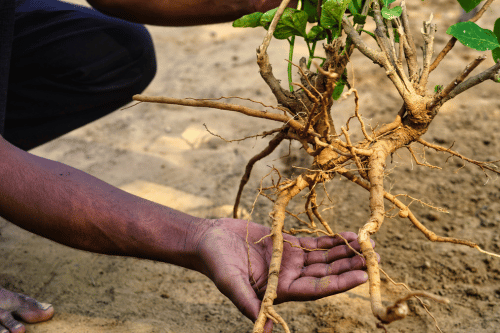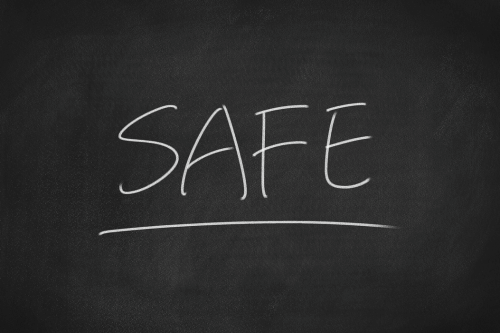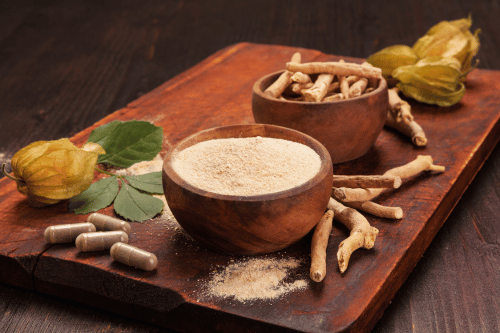Ashwagandha For Kids & Teens | Risks And Benefits
In today’s wellness-focused society, more and more parents are seeking natural ways to support their children’s health and well-being. As a result, the ancient practice of using herbal supplements, particularly from Ayurvedic medicine, has seen a resurgence in popularity.
Among these herbal treatments, ashwagandha stands out for its potential to boost immune health, support mental well-being, and reduce stress. But how does ashwagandha for kids and teens fit into this wellness trend? This article delves into the risks and benefits of ashwagandha supplementation for younger populations, particularly those facing cognitive function challenges or mental health conditions.
What Is Ashwagandha?
Ashwagandha, scientifically known as Withania somnifera, is a well-known adaptogen used in Ayurvedic medicine. Its roots are primarily harvested for their health-promoting properties, earning it the nickname “Indian ginseng.” Adaptogens, including ashwagandha root, are substances that help the body adapt to stress and tolerate stress more efficiently. Ashwagandha has been used for centuries to enhance overall vitality, improve immune system function, and reduce stress.
The use of ashwagandha root extract in modern wellness practices stems from its potential ability to promote cognitive function, boost immunity, and help maintain healthy body cells. Its properties have made it appealing for adults, but an emerging question remains: is ashwagandha for kids a safe and effective option?

Understanding Ashwagandha’s Benefits for Kids and Teens
With its broad range of benefits, ashwagandha has caught the attention of parents, caregivers, and even medical professionals. Children, especially those navigating high-stress environments like schools or extracurricular activities, can sometimes suffer from impaired cognitive function, chronic stress, and weakened immunity. This has led to the consideration of ashwagandha as a supplement for supporting these needs.
Below, we explore the specific benefits of ashwagandha for kids and teens and how it may improve their overall health and well-being.
1. Enhances Immune Health
One of the most notable aspects of ashwagandha root is its ability to support immune health. For kids, especially those attending school where exposure to germs and viruses is high, a strong immune system is essential. Ashwagandha supplementation can help boost immunity by supporting the body’s natural defenses, ensuring that children can maintain their health in these challenging environments. The immune-boosting qualities of ashwagandha are largely attributed to its active compounds, which enhance the body’s production of white blood cells. This, in turn, enables a child’s body to fight off infections more effectively.
In today’s world, where children are constantly exposed to different germs and bacteria, having an herbal ally that strengthens the immune system can be particularly valuable. Parents considering ashwagandha for kids can feel reassured that it is a supplement with immune boosting qualities that could contribute to their child’s overall immune function.
2. Improves Cognitive Function and Focus
Beyond the immune system, ashwagandha root extract has been shown to support cognitive function in both adults and children. For students, focus, attention, and memory are critical elements of academic success. This is especially important for children with learning difficulties or attention-related disorders. Ashwagandha’s adaptogenic properties help to reduce stress and anxiety, which can often impair cognitive abilities, such as memory retention or problem-solving skills.
For children and teens, ashwagandha may offer a way to improve concentration during critical tasks like studying or test-taking. Research suggests that ashwagandha could also be beneficial for children who suffer from attention disorders such as ADHD. By reducing stress and promoting mental clarity, ashwagandha offers a natural approach to improving cognitive function.
Moreover, improved cognitive abilities aren’t limited to academic performance. Enhancing brain power through ashwagandha supplementation could also help children stay focused in other areas of life, such as hobbies, social interactions, and creative endeavors.
3. Reduces Stress and Anxiety
Children and teens are not immune to the pressures of daily life. From academic challenges to social dynamics, many kids experience high levels of stress. Prolonged stress can lead to a weakened immune system, impaired cognitive function, and other health issues. Ashwagandha root powder has been shown to reduce stress by lowering cortisol levels, which is the hormone responsible for the body’s stress response.
Incorporating ashwagandha into a child’s routine may have a potent calming effect, which could help alleviate symptoms of stress and anxiety. Kids and teens who struggle with chronic anxiety or have difficulty managing their emotions may benefit from ashwagandha’s ability to induce a state of calm and well-being.
4. Promotes Better Sleep
A good night’s sleep is crucial for children’s development. Sleep is when the body repairs itself and the brain processes the day’s learning. However, stress, anxiety, and other health conditions can lead to impaired sleep. Inadequate sleep can, in turn, exacerbate problems with focus, mood, and overall performance during the day.
Ashwagandha supplementation has been shown to significantly improve sleep quality by promoting relaxation and reducing stress levels. For children who struggle with getting enough sleep or staying asleep through the night, this natural supplement may offer a gentle way to achieve better sleep patterns, allowing them to wake up refreshed and ready to face the day.
Understanding the Risks of Ashwagandha for Kids
While ashwagandha boasts many benefits, it’s essential to weigh these against the potential risks. Parents must exercise caution when introducing any supplement into their child’s diet, and ashwagandha for kids is no exception. Below are the primary risks associated with its use.
1. Potential for Interactions with Medications
One of the main concerns when it comes to ashwagandha supplementation is its potential to interact with other medications. For children who are already on prescribed medication, particularly for conditions like ADHD or anxiety, combining these treatments with ashwagandha could result in many negative consequences. This may include altering the effectiveness of the medication or causing unexpected side effects.
It’s crucial that parents consult with a healthcare provider before introducing ashwagandha root powder into their child’s routine, especially if they are on any other medications. A professional can assess whether ashwagandha is appropriate or whether it may interfere with existing treatments.
2. Overstimulation of the Immune System
Ashwagandha is praised for its ability to support immune health, but for some children, particularly those with autoimmune diseases or compromised immune systems, its immune-boosting properties could be problematic. While boosting immunity is generally a good thing, in children with sensitive immune systems, ashwagandha supplementation may overstimulate their immune response, leading to negative consequences.
This is especially important to consider for children with chronic health conditions. Parents should be mindful of any potential immune system complications and seek professional advice to ensure ashwagandha is safe for their child.
3. Risks of Overuse or Incorrect Dosage
As with any herbal supplement, there is the risk of overuse or improper dosage. Ashwagandha root extract can cause side effects when taken in high doses or for prolonged periods, especially in children. These side effects could include digestive issues, such as upset stomach, or more concerning problems like disrupted sleep patterns. While ashwagandha root powder is generally considered safe in controlled doses, it’s essential to follow the recommended dosage guidelines.
Healthcare professionals can provide tailored advice on the appropriate dosage for children, ensuring that they receive the benefits of ashwagandha without any undue risks. Parents should avoid self-prescribing and ensure they follow the advice of a qualified practitioner.
Is Ashwagandha Safe for Kids and Teens?

The question of whether ashwagandha is safe for kids is nuanced. In many cases, ashwagandha can be a valuable addition to a child’s wellness routine, offering benefits such as improved immunity, reduced stress, and better cognitive function. However, the safety of ashwagandha for kids depends on several factors, including the child’s health status, current medications, and the proper dosage.
1. Monitoring Dosage and Usage
As mentioned, the dosage of ashwagandha is crucial. For children and teens, smaller, carefully monitored doses are typically recommended. Parents should avoid exceeding the suggested dosage and ensure that the supplement is not used in conjunction with certain medications that could interact negatively.
It’s also essential to monitor the child for any signs of side effects, especially during the first few weeks of supplementation. If a child experiences digestive issues, sleep disturbances, or changes in mood, it may be necessary to adjust the dosage or discontinue use altogether.
2. Balancing the Benefits and Risks
While the potential benefits of ashwagandha are significant, they must be carefully weighed against the possible risks. Parents should take a balanced approach, considering whether the child genuinely needs the supplement or if other interventions (like dietary or lifestyle changes) might be more appropriate.
For kids dealing with stress and anxiety, impaired sleep, or cognitive challenges, ashwagandha supplementation may offer a natural and gentle solution. Still, it is always important to consult with a healthcare provider to determine the best course of action.
Frequently Asked Questions about Ashwagandha for Kids
Can Ashwagandha Be Taken by Kids?
Yes, ashwagandha for kids can be taken, but only under the supervision of a healthcare provider. The dosage should be carefully controlled, and parents should monitor for any side effects or interactions with other medications.
Is Ashwagandha Good for Kids with ADHD?
There is some evidence to suggest that ashwagandha could be beneficial for children with ADHD, as it may help improve cognitive function and reduce stress. However, more research is needed, and it should always be taken under the guidance of a healthcare professional, especially for children with existing conditions.
What Is the Age Limit for Ashwagandha?
Ashwagandha is generally recommended for children over the age of 5. For younger children, it’s important to consult with a healthcare provider before considering supplementation.
Conclusion
The use of ashwagandha for kids and teens presents both opportunities and challenges. While it offers several promising benefits, including improved immunity, cognitive support, and help with boosting brain power, it’s essential to proceed with caution. Ashwagandha root extract has also been shown to reduce stress and alleviate symptoms of anxiety, making it an effective option for managing anxiety ashwagandha treatments. However, parents should always consult with a healthcare provider before introducing ashwagandha root extract or ashwagandha root powder into their child’s routine, particularly if the child is taking other medications or has an existing health condition.
In summary, ashwagandha for kids is a safe and natural way to support overall health when used responsibly. By carefully balancing the potential benefits with the risks, parents can make informed decisions about whether this Ayurvedic medicine is right for their child.

FAQ's For Ashwagandha For Kids
Ashwagandha is known for its adaptogenic properties that help in boosting brain power. It can enhance focus, memory, and overall cognitive function, making it beneficial for children who struggle with learning or attention-related issues. Always consult a healthcare professional before introducing it to a child’s routine.
Yes, ashwagandha is often used for managing anxiety due to its calming effects. It helps reduce stress and anxiety by balancing cortisol levels. However, it’s essential to consult with a doctor to ensure that ashwagandha is suitable for addressing your child’s anxiety-related concerns.
The safe dosage of ashwagandha for children depends on various factors such as age, weight, and overall health. It’s important to follow the advice of a healthcare provider to determine the appropriate dosage and ensure it’s safe for your child.










